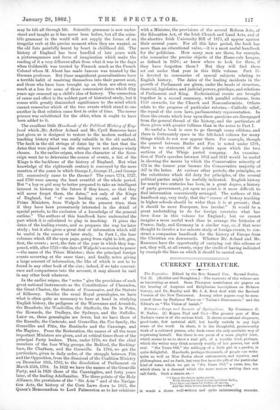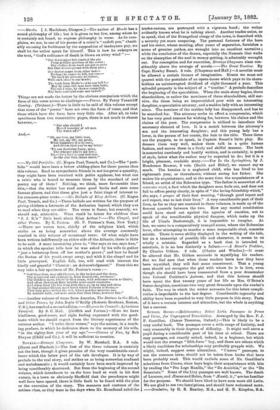POETia.—Songs and Sonnets of Spring-time. By Constance C. W. Haden.
(C. Kegan Paul and Co.)—The greater part of Hiss Naden's verse is of the serious kind. It shows occasional eloquence, good-taste, fair metrical skill, but hardly melody in any high sense of the word. In short, it is the thoughtful, praiseworthy work of a cultured person, who finds verse the only available way of expressing herself. Bat there is one poem of a more playful kind, which seems to as to show a real gift, of a humble kind, perhaps, which the writer may think scarcely worthy of her powers, but still real. "Six Years Old," the soliloquy of a little girl in a garden, is quite delightful. Hundreds, perhaps thousands, of people can write quite as well as Miss Haden about astronomers, and mystics, and philosophers, and so forth, but very few have the gift of the particular kind of verse which we get in "Six Years Old," a verse, too, for which there is a demand which the more serious writing does not call forth. Such a stanza as,— " I fancy the fair:es make merry,
W:th thorns for them knites and their forks. They have currants for bottles of sherry, And the little brown heads are the corks,"
is worth a dozen well-written and quite uninteresting sonnets. —Moods. ( J. Maclehose, Glasgow.)—The author of Moods has a sound philosophy of life ; but it is given to but few, among whom he is certainly not found, to express philosophy in verse. As ho com- plains, we see, in one of his poems of a critic's " undeft pen," charit- ably excusing its feebleness by the supposition of inadequate pay, we shall let the writer speak for himself. This is bow he enlarges on the text, "God's ordinance of death is blown on every wind" :—
"Our drain-pipes but conduct the gas From perilous purlieus of the sewer ; Our clothes from wash are not so pure
But that disease-germs with them pass ;
Our doctor comes from other beds— Perhaps he comes to kill, not cure—
'Tie hard his presence to endure. With such ideas in our heads; The book from Mudie's—who can tell ?- May by some sick man have been held ;
The cab I take, by shower compelled, May have conveyed some one unwell."
Things are not made the better by the obvious comparison which the form of this verse seems to challenge—Poems. By Percy Tunnicliff Cowley. (Triibner.)—There is little to be said of this volume except that some of the "poems" have not even the form of verse, and that those which have the form have very little else. After all, to take specimens from two consecutive pages, there is not much to choose between,—
"Oh. my love, my little love, My joy, my life, my pride, What happiness it is to rove,
And dream that you're my bride!
'Tis not deceiving fancy, mine,
The whisper you're my love ; No,—'tis a love as real and true
As the star that shines above."
—My Old Portfolio. (C. Began Paul, Trench, and Co.)—The " port- folio " would have been a better abiding-place for these poems than this volume. Read to sympathetic friends in not too great a quantity, they might have been received with polite applause, but what can a critic who is bound to measure them by the standard of real poetry say of them ? Nothing, we think, more favourable than this,—that the writer has read some good books and seen some famous places, and that these give just a faint tinge of interest to his common-place verse.—Sia Ballads of King Arthur. (C. Began Paul, Trench, and Co.)—These ballads are written for the purpose of giving children a foretaste of the Arthurian legend, which they are to read when they are older. The verse is fluent, but scarcely, we should say, attractive. What could be better for children than "J. J. R.'s " little book about King Arthur P—The Chapel, and other Poems. By E. Foxton. (G. P. Patnam's Sons, New York.) —There are verses here, chiefly of the religions kind, which strike us as being somewhat above the average commonly reached in this volume of occasional verse. Of what might have been written indifferently on either side of the Atlantic, there is little to be said. A more interesting piece is, "She says to me, says Ann," in which the speaker tells how he was asked by his wife to gather "just a buttercup from off her mother's grave ;" and how he found the Boston of his youth swept away, and with it the chapel and its little graveyard. English folk, too, will read with interest the kindly and graceful " Chester : an Acknowledgment." From this we may take a fair specimen of Mr. Foxton's verse :—
" God bless thee, dear old Chester, in thy basket and thy store,
Thy goines-out and comings-in, from henceforth, evermore! Thy children meet, whereer they roam, with welcomes warm as theirs, And often cherish at their hearths some angel unawares.
Anti when their life hss done with thee, go up to sing and shine
Ii, that eternal Church most loved whose Founder is divine,—
That holy place within the veil, whose porches minsters are. By mortals built, and none more dear than thine, however fair."
—Another volume of verse from America, The Statues in the Block, and Other Poems, by John Boyle O'Reilly (Roberts Brothers, Boston, U.S.), has reached a second edition.—Rhymes in Council : Aphorisms Versified. By S. C. Hall. (Griffith and Farran.)—Hore we have kindliness, good-sense, and right feeling expressed with the good- taste which we should expect from tho literary experiences of the veteran author. "I write these verses," says the author, in a touch. ing preface, in which he dedicates them to the memory of his wife, "in the eighty-first year of my age."—Gleams of Fun, by Bub Skryne (Child and Co.), it will be sufficient to mention.
" But why should I Myself consider of all men The worst off r
And,—







































 Previous page
Previous page